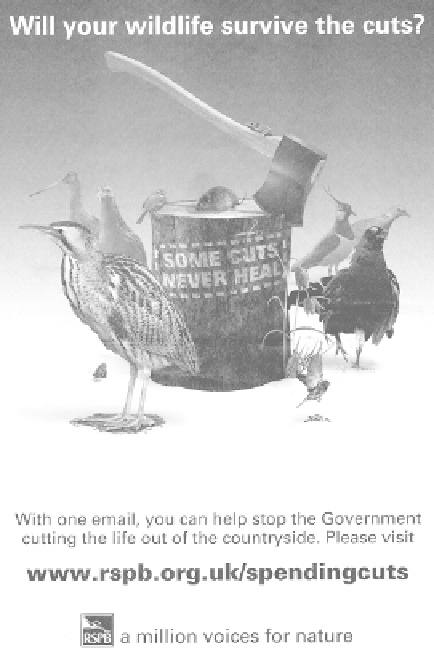Geoscience Reference
In-Depth Information
Will your wildlife survive the cuts?
W\: j
With one email, you can help stop the Government
cutting the life out of the countryside. Please visit
www.rspb.org.uk/spendingcuts
a million voices for nature
This Royal Society for the Protection of Birds (RSPB) advert, placed in a British broadsheet newspa-
per in August 2010, illustrates well the two aspects of representation: namely, 'epistemic' (speaking
of) and 'political' (speaking for). The strapline 'A million voices for nature' announces clearly the
political intention of the RSPB and its members: to speak up for birds and the other wildlife species
to which they relate (because birds can't articulate their own interests). In this case, the RSPB is
opposing funding cuts to public programmes that aim to sustain rural biodiversity. At the same
time, the advert's declaration that 'Some cuts never heal' has - in addition to its intended emotional
charge - an epistemic role. It refers to the biophysical damage, to birds and other wildlife, of the
spending cuts, and is presented as a broadly 'truthful' statement about species endangerment and
loss. Thus is a purported 'fact' about birds used to stake a political claim about their future.
In the early years of modern European democracy, when the
ancien
régime
was crumbling, the influential polymath Jean Jacques Rousseau was,
famously, a critic of representation in both its senses ('speaking of ' and
'speaking for'). He regarded representation as alienation because, in his view,
it distances us from the world and makes us reliant on others who may
not, in the end, serve us well. In his most idealistic moments, he favoured
the immediate over the mediate and presence over absence because he
wanted to empower us and have us take responsibility for what we think,
say, feel and do. The echoes in William Clifford's and John Dupré's earlier


